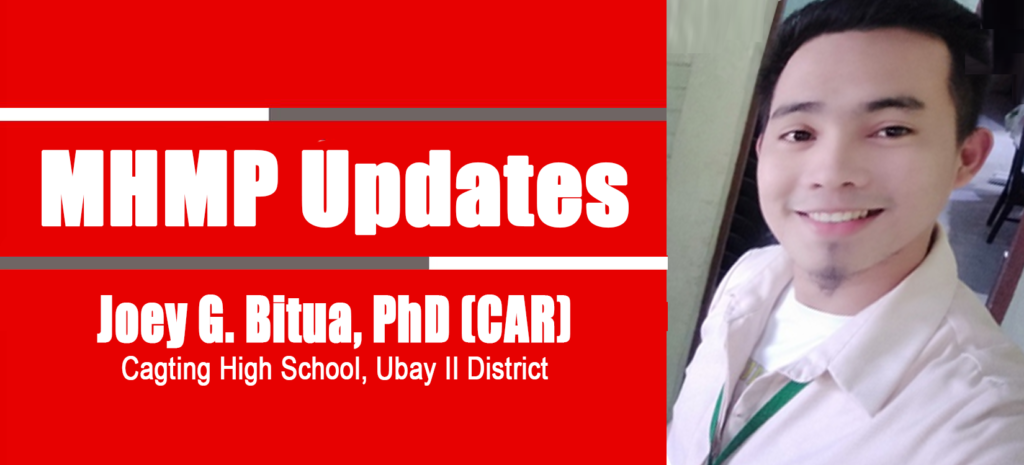
QUALITY and accessible education has always been the ultimate goal of every education system not just in the Philippines but worldwide. Many educators have pursued various research to seek the best ways to achieve this goal. In 1990, a world declaration on the Education for All (EFA) happened in Jomtiem, Thailand which prescribed the achievement of Basic Learning Needs. In this connection, the Philippines crafted and implemented its own EFA in the year 2003 although it was officially approved by the government in 2006.
One of the goals of EFA is to expand and improve comprehensive early childhood care and education, especially for the most vulnerable and disadvantaged children. With this, the Department of Education, Division of Bohol implemented the Amoma, Giya, Alayon sa Kalampusan (AGAK) Program through Division Memorandum (DM) No. 199 s. 2014. As stated in the memorandum, AGAK is a Child Nurture Program that envisions 100 percent completion of all students in the Basic Education. The goal of the AGAK program is to provide sponsorship to indigent Boholano students that are at risk of dropping out so that they will have the chance to finish elementary and high school. This program has been carried out by teachers and school heads of the public schools of DepEd, Division of Bohol. They were directed to identify and adopt a Student-At-Risk of Dropping Out (SARDO) and provide academic and financial support.
The indicator that determines the success of the adoption is if the student can complete his or her elementary or secondary schooling. This time from AGAK it was change into EAGAK (Enhanced Amoma, Giya, Alayon sa Kalampusan) through Division Memorandum (DM) No. 1138 s. 2021. With this program, the Chief of School Governance and Operations Division Dr. Desiderio V. Deligero and the Division GAD Focal Person in the name of Dr. Ma. Maya V. Tumalon has initiated some activities like Designation of District Coordinators for the Revitalized and Enhanced Amoma, Giya, Alayon sa Kalampusan (EAGAK) – “A Child Nurture Program” and conducts virtual conferences to enliven the program and capacitate teachers and school heads to adopt the program amidst this COVID-19 Pandemic. This program of DepEd Bohol would be a great help because this will give hope and encouragement to our learners most especially those struggling students to continue their studies. Additionally, the program notably yielded positive results in the reduction on the number of student dropouts and the prevention of SARDO in schools. It was highlighted also during the virtual conferences together with all the district coordinators to submit success stories, promising practices and other documents relative to the “EAGAK” Program Implementation. Our unstinted support and cooperation to this laudable undertaking during this difficult time is greatly appreciated not just for our own benefits but rather the impact to our learners’ education.
This program could be anchored to the following Legal Bases United Nations Convention on the Rights of the Child (November 1989). It provides that State Parties recognize the right of the child to education and with a view to achieving this right progressively and based on equal opportunity. The AGAK program is designed as a drop out reduction program initiated by the DepEd-Division of Bohol. Its ultimate goal is to attain the zero-dropout rate in every school of Bohol. Since the implementation of AGAK in 2014, some teachers made effort in helping the identified students. Some students were able to finish the school year and even finish the Junior High Level, but these students who were saved from dropping out are those whose main reason for struggling is due to financial problems. The financial assistance given by some teachers helped them finish their schooling. However, there are several students who were not saved from dropping out. Most of these students’ reason for dropping out are lack of interest and seeking employment and there were some who developed illnesses and diseases.
Through the AGAK program, teachers were able to feel the hardships of their students and it gave them better understanding of their behavior in school which helps them in the management of their classes. However, the stakeholders of the school and the people of the community on what they perceive with the efforts of the school teachers and administrators cannot be directly attributed to the AGAK program because they were not oriented in the processes of the program and its provisions.
The Enhanced Amoma, Giya, Alayon sa Kalampusan (EAGAK) Program aims to help indigent Boholano students to succeed in finishing the basic education, which is in line with the goals of EFA. However, its implementation experienced challenges and issues due to the following reasons: First, there were no proper identification of students to adopt in the program; Second, the assistance given to the students did not correspond to their needs; Lastly, the monitoring of the implementation of the program was not constantly done. The teachers who are implementers of the program, find it difficult to follow through the progress of their adoptees due to other workloads in the school most especially in this trying time. Thus, only few students were saved from dropping out making the dropout rate remain as a negative indicator of the school’s performance. These results, however, do not generalize the performance of the program in the entire division of Bohol. Despite having issues in the implementation at school level, as pointed out based on the level of experience, resolutions can be done to achieve the goals of the program. We can help in our own little way by fostering the dreams of young minds by simply providing them not just financially but also uplifting and encouraging them that education is very important as “Education is the most powerful weapon which you can use to change the world.” This quote by Nelson Mandela is one of the most famous sayings on the value of education.

